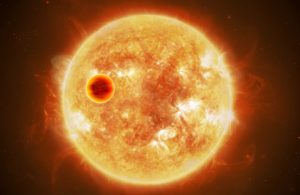UK takes the lead in exoplanet mission with 拢30 million investment
皇冠体育app UK Government will invest 拢30 million to secure the UK鈥檚 leading role in developing a space telescope to explore exoplanets.

Artist's impression of exoplanet in front of star. Credit: ESA/ATG medialab, CC BY-SA 3.0 IGO
Due to launch in 2029, Ariel鈥檚 mission is to understand the links between a planet鈥檚 chemistry, its evolution and its host star, by characterising the atmospheres of 1,000 known planets outside our solar system.
It is the first space mission dedicated to this analysis and will provide a step-change in our understanding of what exoplanets are made of, how they were formed and how they evolve. Scientific data will be released to the scientific community and general public at regular intervals throughout its planned four-year operational phase.
Ariel, which was proposed by an international consortium led by University College London (UCL), was selected by the European Space Agency (ESA) from 26 proposals put forward to be the next 鈥榤edium class mission鈥� in its science programme. 皇冠体育app UK will lead the overall science of the mission and head up a consortium of 17 countries building the mission鈥檚 payload module.
皇冠体育app investment is the first major long-term commitment that the UK has made to space science since the publication of the National Space Strategy and the leadership role will provide an unprecedented opportunity for the UK space sector鈥檚 academic base.
Science Minister George Freeman said:
This is an incredibly important commitment for UK space science and technology, marking a major milestone for the National Space Strategy and boosting our ambitions to grow our 拢16.5 billion commercial space sector.
By investing 拢30 million and taking the helm of the entire Ariel consortium 鈥� the first time in a decade that we have secured leadership for a mission of this magnitude 鈥� we are putting the UK at the heart of international space research, providing new opportunities for space businesses and academics across the country.
皇冠体育app 拢30 million is provided through the UK Space Agency鈥檚 National Space Science Programme and is in addition to more than 拢6 million the Agency has already provided to support UK teams during Ariel鈥檚 study phase up to March 2022.
This investment will secure the UK鈥檚 scientific leadership of the mission and will incorporate the delivery of Ariel鈥檚 payload module, cryogenic cooler and optical ground support equipment, as well as science operations and data processing.
UK organisations contributing expertise to the UK鈥檚 role as mission consortium Principal Investigator and payload lead include University College London (UCL), Cardiff University, University of Oxford and the Science and Technology Facilities Council鈥檚 (STFC) RAL Space at Harwell Space Cluster in Oxfordshire.
Professor Giovanna Tinetti, Mission Consortium Principal Investigator for Ariel at UCL, said:
Ariel will be transformational in helping us understand the planets in our galaxy. By studying hundreds of diverse worlds in different environments, we will see our own planet in context, giving us a better sense of why Earth formed as it did.
We are very grateful to the UK Space Agency and the UK government for their continued support and commitment in advancing planetary science, helping us understand worlds beyond our solar system as well as within it.
Paul Eccleston, Ariel Consortium Programme Manager and Chief Engineer at RAL Space, said:
We welcome the agreement and the commitment from the UK Space Agency to enable this collaboration. I鈥檓 delighted that the UK is taking a leading role in the mission and proud of the progress the consortium has already made to design the payload. 皇冠体育appse ties are only set to strengthen as we progress towards launch.
Teams at RAL Space will build and test the Ariel payload module, managing hardware contributions from other consortium nations, while the STFC Technology department is developing the 拢5.5 million cryogenic active cooler system.
Scientists at UCL and University of Cardiff will lead performance analysis, testing and fine-tuning the complex algorithms that will process the data returned from Ariel. 皇冠体育app University of Oxford team will deliver the equipment to test Ariel鈥檚 payload telescope and optical elements.
G眉nther Hasinger, ESA鈥檚 Director of Science, said:
Ariel is a very important mission for ESA鈥檚 Space Science programme, and among our world-leading fleet of missions that study extrasolar planets.
This commitment by the UK Space Agency and our scientific partner institutions in the UK is a big step forward for Ariel, and we are looking forward to working together closely on implementing the mission.
A payload design review will be completed later this year, with the design expected to be finalised by 2025. A flight acceptance review will be completed in early 2029 ahead of launch later that year.
Ariel鈥檚 full name is the Atmospheric Remote-sensing Infrared Exoplanet Large-survey. You can learn more about the mission through the , created by UCL and ESA.